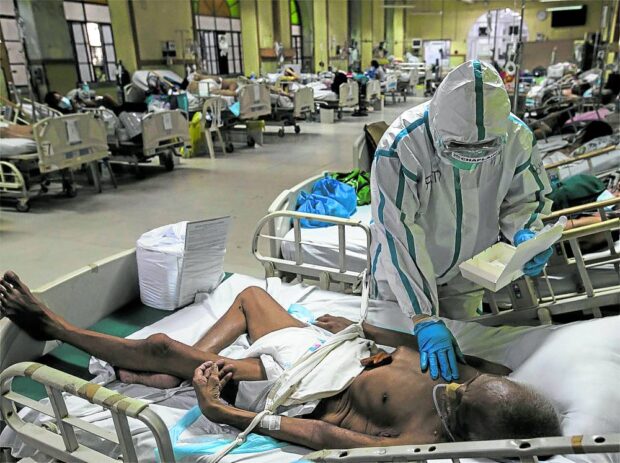
OVERLOADED | A hospital worker checks on one of the patients in a full ward of the Philippine General Hospital during the pandemic. (INQUIRER FILE PHOTO)
MANILA, Philippines — To make health care more accessible, especially to poor Filipinos, the Department of Health (DOH) said it aims to build 28 primary care facilities nationwide.
“Our plan is to build 28 of these primary care facilities to cater to 28 million poor Filipinos by 2028,” Health Secretary Teodoro Herbosa said in a recent press briefing.
To be called National Ambulatory and Urgent Care Facilities, he said these health hubs would be spread out in “strategic parts” of the country to be able to reach out to communities lacking healthcare establishments.
“The idea here is to decongest our regional hospitals where there are long lines of patients. Many are complaining that these hospitals offer complete health services, but the waiting time is too long because there are too many patients,” Herbosa said.
“We will unload these regional hospitals. We will build these health facilities in provinces lacking hospitals, particularly within the compound of state colleges and universities with medical schools,” he added.
The DOH chief likened the facility to the outpatient department of the Philippine General Hospital in Manila, which serves 3,000 to 5,000 patients a day.
“This will not be a barangay health station or a rural health unit. This will be a hospital, but without [the reliance on] beds,” Herbosa said.
These facilities would have complete services such as family medicine, OB surgery medicine, orthopedics, endoscopy, magnetic resonance imaging, CT scan, X-ray and laboratory, and even same-day surgery.
It would also have a pharmacy where free medicine could be provided to indigent patients.
PhilHealth packages
Herbosa said he was expecting Philippine Health Insurance Corp. (PhilHealth) to prepare the primary care benefits package for these facilities.
“Because every Filipino is a PhilHealth member. The consultation will be paid, as well as the medicines and operations,” he added. Under the Universal Health Care Act, all Filipinos are automatically enrolled in the National Health Insurance Program, which PhilHealth implements.
The creation of these facilities will also help the DOH achieve its eight “priority goals” for 2024, which are tied to primary care: immunization; nutrition; maternal health; tuberculosis; road safety; prevention of noncommunicable diseases with a focus on hypertension and diabetes; cancer; and the digitalization of the health sector. INQ